European colonialism in Africa birthed the current political order in most African countries. Britain, France, Germany, Portugal, Spain, and Italy were the major European powers that were involved in the complete colonization of Africa. However, the two nations that held the most colonies in Africa were France and Britain.
Why Europe Colonised Africa
Before European colonialism in Africa, the continent had wider flexibility of movement as national borders were almost nonexistent. There was no structural form of government as large communities led to the formation of kingdoms, powerful empires, and city-states. This led to the formation of common languages, beliefs, traditions, cultures, value systems, art, lifestyle, and religious practices.
However, a global European process of reaching all the continents of the world led to the colonization of Africa and this process changed the world dramatically.
European countries fought to take over African countries mainly because of their natural resources. Their reasons ranged from economic, political, and religious.
At that time, the European continent was faced with economic depression and countries were losing money. Apart from being out of harm’s way, Africa had an abundance of raw materials.
Another reason for the colonialism in Africa was the need to use the African population which served as cheap labour for European industries.
The Scramble for Africa
The Scramble for Africa, which was the phrase used to describe European colonialism in Africa, began during the New Imperialism between 1881 and 1914.
In 1884, at the request of Portugal, German Chancellor, Otto von Bismark, at the Conference of Berlin and British New Imperialism, called for an end to the confusion over the control of Africa. They met to discuss the division of Africa, without Africa being present. They shared Africa like a piece of cake.
The countries represented at the conference included Germany, Belgium, Italy, Great Britain, Russia, Spain, Austria-Hungary, the Netherlands, Denmark, France, Portugal, Sweden-Norway, Turkey, and the United States of America.
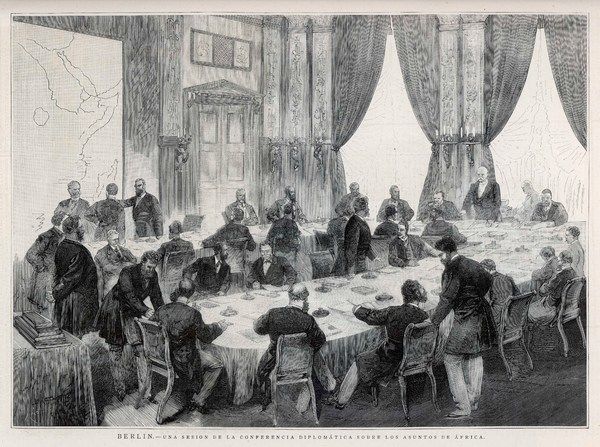 BERLIN CONFERENCE: Otto von Bismarck presides over a diplomatic conference to discuss colonialism in Africa.
BERLIN CONFERENCE: Otto von Bismarck presides over a diplomatic conference to discuss colonialism in Africa.
Great Britain, France, Portugal, and Germany were the major players out of the 14 countries at the conference. They were controlling most of Africa at the time.
The conference lasted for three months and it saw the European countries bargaining over geometric boundaries which led to the division of the continent of Africa into 50 irregular countries and the beginning of colonialism in Africa.
What Led to the Colonialization of African Countries?
The rivalry between Britain and France in the quest for colonialism in Africa also saw them fighting over the acquisition of the continent’s territories. By 1900, the majority of Africa had been colonized by seven European powers, Britain, France, Germany, Belgium, Spain, Portugal, and Italy.
These powers established colonial state systems, which were authoritarian and bureaucratic, and were the machinery of administrative domination to facilitate effective control and exploitation of the colonized societies.
However, these European countries were successful in colonizing Africa rapidly mainly because of the rivalries between African leaders.
Kings and Chiefs were competing with themselves over who was the wealthiest and most powerful and the Europeans took advantage of this by luring some leaders to their sides to join forces with them to fight their rivals.
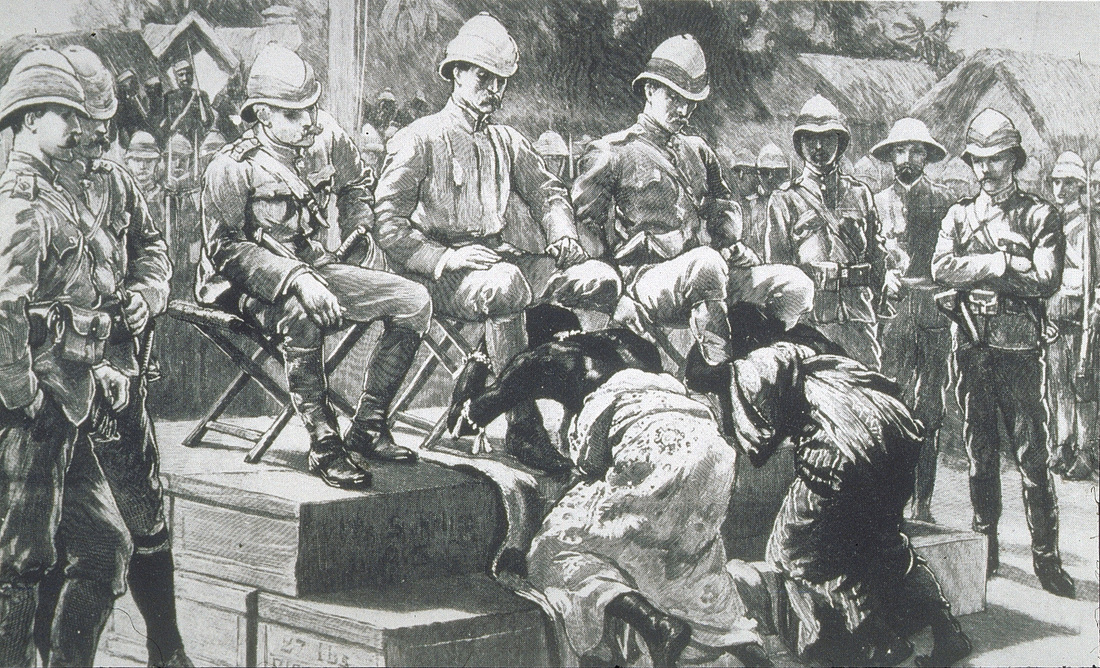 The Ashanti King Prempeh submits to British rule in West Africa in 1896.
The Ashanti King Prempeh submits to British rule in West Africa in 1896.
Also, the sophisticated weapons which the Europeans possessed and the Africans lacked, made the continent vulnerable to their domination. They took control of colonies using force and violence.
Some natural disasters equally played a large part in the rapid colonialism in Africa. Drought in 1895 led to a food shortage which caused the death of both man and animals and also weakened the population. There was also a plague of locusts which destroyed the few crops grown. Cattle plague also broke out leading to the death of cattle, sheep, and goats.
All these incidents worked against the African continent and made them prey for the Europeans.
The British and French colonized more than 95% of the African continent. While Britain colonized 22 African states, France colonized 20.
France retained control of the Northern, Western, and parts of Central Africa while Britain had control of Eastern and Southern Africa.
The entry of the Europeans into Africa led to the spread of their culture, religion, and most especially, language. Today, most African countries use either French or English as their major or second language.
French Colonialism in Africa
The French had been in Africa as early as the 1600s but this changed during the Industrial Revolution when European countries had a need for raw materials and manpower, thereby seeing Africa as their “go-to”.
After the Berlin Conference in 1884, where an agreement was made concerning colonialism in Africa, France colonized West Africa between 1890 and 1914.
The French established its first African colony in 1830 after seizing Algeria.
Some other African countries colonized by France include Senegal, Gambia, Chad, Mali, Benin Republic, Sudan, Gabon, Tunisia, Niger, the Republic of Congo, Cameroon, and Cote d’Ivoire. France colonized more countries in West Africa compared to other parts of Africa. All its colonies there were constituted into a loose federation with its headquarters in Dakar, the present-day capital of Senegal. The system of administration adopted was known as the policy of assimilation whose aim was to assimilate and transform all Africans in their colonies into French men and women. In other words, it was the imposition of the French culture, language, religion, law, traditions, lifestyle, and art on the West African culture.
Due to the failure of the policy of assimilation, mainly because of widespread criticism, France abolished the policy and introduced the policy of association which is akin to indirect rule. The policy of association respected the African people’s culture and their political institutions were recognised.
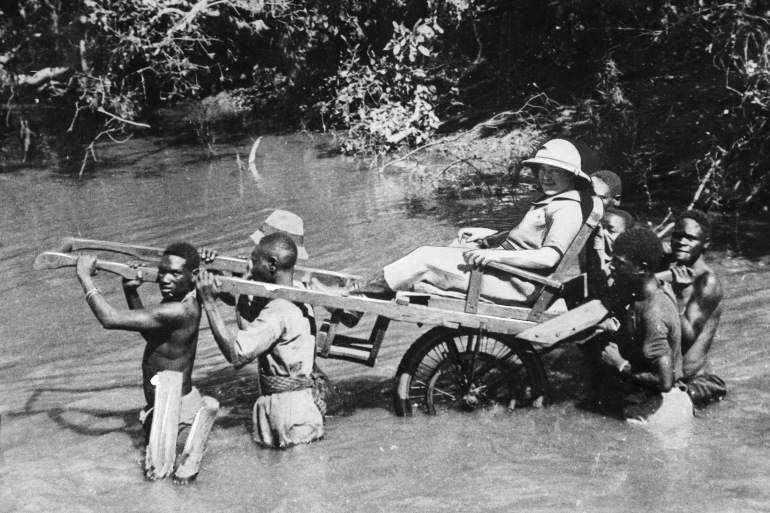 Some of the damages done by colonialism in Africa have been said to be too large to be repaired.
Some of the damages done by colonialism in Africa have been said to be too large to be repaired.
British Colonialism in Africa
For a long time, Britain was only interested in having a few outposts in West Africa for the slave trade business. However, British abolitionists succeeded in outlawing the slave trade in 1807. It wasn’t until the latter part of the 19th century that Britain’s interest in colonizing Africa was aroused and the Scramble for Africa led the British to aggressively expand and defend their colonies.
The Berlin Conference, which kickstarted colonialism in Africa that carved up the continent, saw the British get to the Southern and Northeastern parts of the continent, thus leading Britain to spread its tentacles across the continent of Africa. It included lands in North Africa, much of West Africa, and a whole lot of territories in Eastern and Southern Africa.
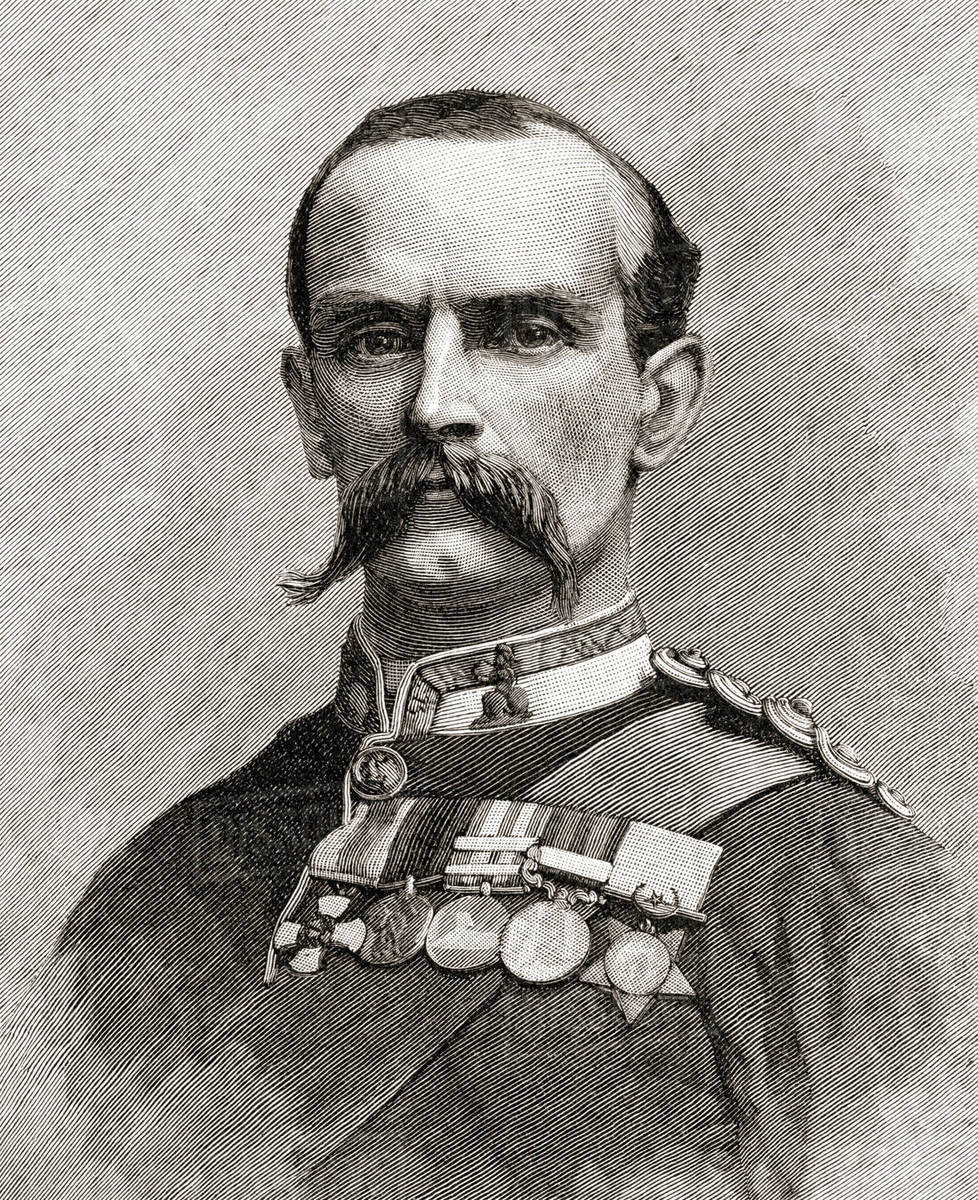 Lord Frederick Lugard, Governor-General of Nigeria (1914-1919).
Lord Frederick Lugard, Governor-General of Nigeria (1914-1919).
Some African countries affected by British colonialism in Africa include South Africa, Zimbabwe, Ghana, Malawi, Nigeria, Kenya, and Uganda.
One notable Briton who justified the colonization of Africa was David Livingstone. He was an explorer who went around much of Africa’s interior. Livingstone reported back home that Britain had a duty to introduce the Three Cs, that is Christianity, Commerce, and Civilisation, to Africa. It was thought that Christianity would provide the moral principles that would guide Africans while commerce and civilization would encourage them to produce their own goods.
Therefore, it is no secret that British colonialism in Africa had a significant impact on the lives and economy of Africans. Ruling in Egypt, the main interest of the British was to have control of the trade route starting from Egypt to the Red Sea all the way to India. The Egyptians were receptive to the British and even sent their children to school in Britain. Britain in return did not interfere with their Islamic beliefs and even assisted in building some mosques. Meanwhile, in West Africa, the British were more heavily involved with the leaders of these nations, allowing them to rule their people any way they deemed fit but they still paid their taxes to Britain. They adopted the British language, dress, lifestyle, and religion, were educated in Britain, and took up positions in the civil service.
However, in South Africa, a different scenario played out. There was a mixture of the British, Boers (who were descendants of Dutch settlers from the 1600s), and native Africans such as the Xhosa, the Zulu, and the Matabele. The Boers disliked British colonialism in Africa because they saw the native Africans as inferior to them and treated them as slaves while the British insisted that they have rights. Tensions between them eventually led to the Boer War, from 1899 to 1902, which ended with a British victory, and peace terms were drawn.
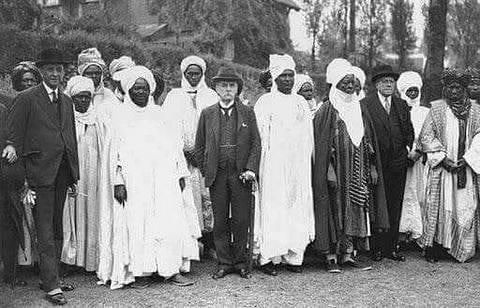 Lord Frederick Lugard with Northern Nigeria’s traditional Emirs at the London Zoo, 1934. Waiting to be presented to King George V of England, Lugard took his guests to the Zoo for sightseeing.
Lord Frederick Lugard with Northern Nigeria’s traditional Emirs at the London Zoo, 1934. Waiting to be presented to King George V of England, Lugard took his guests to the Zoo for sightseeing.
Thus, with these variations, it is difficult to make a conclusive judgment about British colonialism in Africa. Their arrival on the African continent definitely disrupted the traditional African culture and traditions and widened the gap between the people and their Chiefs but it also brought about a change in the economy of the countries, development in terms of infrastructure, education, and enlightenment, and medical solutions that were otherwise unknown.
It also saw the end and abolishment of some archaic traditions and cultures that were in times past done out of ignorance. For example, the killing of twins.
Compared to other European invaders and their colonialism in Africa, the British were tolerant of the religious beliefs and practices of the people. They were also aggressive and intentional in their fight to end the slave trade.
The Difference the French and British Colonialism in Africa
There are so many dissimilarities between the administration of the French and that of the British during their colonialism in Africa. While Britain practiced the indirect rule system of government, France adopted a direct rule system of government. The indirect rule system of government utilizes the traditional political institutions of the people to govern them which gives each colony the opportunity to administer their area as long as the indigenous leaders agreed to do whatever the colonial masters ordered.
On the contrary, a direct rule system of government is when central authority dominates and takes direct control over the rule and administration of a territory that had been largely self-governing.
Thus, the British respected traditional rulers while France was in contempt for local languages, traditions, and culture. Indirect rule was the brainchild of the British colonial administrator, Frederick Lugard, and was the main system used by the British in overseeing their colonies compared to other systems of government they had in operation. They used African leaders to work on their behalf and imposed obedience on their fellow Africans.
Lugard first experimented with the indirect rule in Northern Nigeria which worked with the Emirs and the Sokoto Caliphate in charge but this rule failed in the Southern part of Nigeria. In the North where indirect rule seemingly worked, the Fulani Emirs were autocratic and corrupt which led to riots from non-Fulanis and non-Muslims protesting their misrule.
In his book, The Dual Mandate in British Colonial Africa, Lugard theorized the system of administration that he established in Northern Nigeria, where he preserved the judiciary, administrative, and religious structure of the Sokoto Caliphate.
Also, while France federated her colonies in West Africa, Britain did not. France operated a federal system where all the territories in West Africa were administered as a whole from the center in Dakar, while the British allowed each territory to operate as a separate entity and Governors had room to act based on what the situation demanded.
Britain permitted the function of political associations and allowed the development of parliaments and assemblies while France withstood the formation of such.
During their colonialism in Africa, Britain did not practice the assimilation policies of the French and as such, did not attempt to make English persons out of the Africans.
French officials were also frequently transferred from one station to another to prevent them from planting their influence there while the British allowed their officials to stay for a long time at a place and familiarise themselves with the people and their customs. As a matter of fact, it was incumbent on any British administrator to be fluent in the local language of his domain.
Another major difference between British and French colonialism in Africa is education.
Education was mainly undertaken by religious missionaries and partly financed by public funding in British colonies but the French were more attuned to public schools in their colonies.
Mission schools which had more African teachers teaching in their local languages were more efficient at educating a large number of children and primary school enrolment was on the high side in British colonies. Cooperation between the missionaries and the colonial government cannot be undermined as this played a huge role in the success of academic pursuit. One other aspect of opposition between British and French rule concerns civil liberties.
Restriction of civil liberties was harsher on the French side than on the British side. In terms of forced labor, French colonies took the form of both labor tax and the use of military conscription for public works. Labor tax required Africans to work for a specified number of days every year on local public work projects while military conscripts were used for longer periods of time on larger-scale projects.
The British, on the other hand, abandoned forced labor in their colonies by ratifying the 1930 International Labour Office Forced Labour Convention.
In terms of hierarchical administrative structure, under the French, there was a Colonial Master based in France who had a subordinate, Governor-General, based in Dakar. This was followed by a Lieutenant-Governor located in each of the territories and the territories were divided into Cercles which were headed by a Commandant du Cercle. The next in rank was the African Chiefs.
This was also similar to the British hierarchy having a Secretary of State for the colonies in London appointed by the British crown. Next is the Governor stationed in the colony; and under the Governor were the Regional and District Commissioners and then, the local chiefs.
British laws differed from colony to colony but the French had unifying laws across their colonies.
Impact of Colonialism in Africa
Colonialism can be said to be a direct form of imperialism but it is often said that all colonialism is imperialism but not all imperialism is colonialism.
How far has colonialism been said to have impacted Africa? Or should the question be, how much has Africa allowed colonialism to affect it as a continent in all ramifications?
One major impact of colonialism in Africa is that it brought about underdevelopment in the continent in different ways. Despite the fact that colonialism in Africa brought education, enlightenment, and some form of civilization, it is partially responsible for its underdevelopment.
Not being rooted in African culture, colonial education was essentially literary and had no organic linkage to the African environment. There was no technological base and was, therefore, in opposition to real or industrial development.
Colonial education set out to train clerks, artisans, and interpreters who would serve them in their exploitation of the continent’s rich resources and was not aimed at industrialization or technological development.
The introduction of colonial education made Africans abandon their arts and crafts which were sculpting, cloth weaving, carving, and mining but instead settle for just reading and writing.
Colonialism in Africa also distorted the pattern of economic growth and development in the continent. There was disarticulation in the provision of social amenities, transportation, production of goods, and pattern of urbanization.
Africans were not allowed to go into manufacturing but rather relegated to exporting raw materials and importing finished products. Even food is being imported which has led to food shortages and escalation in the prices of foods that can be otherwise grown locally.
Road networks are not left out. The colonial masters focused on building rail tracks and roads that would facilitate their export of raw materials found in Africa and were not interested in building a transport network to link rural areas which would bring about economic growth and development.
Another problem colonialism in Africa caused was the concentration in only a particular area. Most of the social amenities provided were focused on major cities and minor towns and villages were ignored. The urbanization pattern was disjointed. This led to rapid rural-urban migration, overcrowding in major cities, poor hygienic conditions of living, a rise in social vices, and tribal and ethnic conflicts.
In conclusion, colonialism in Africa brought devastating consequences to the continent that it is yet to recover from. It came to ensure that the African continent would always be dependent on their European colonial masters and will not be self-sufficient. It is indeed a sad story.
credit: thehistoryville.com

